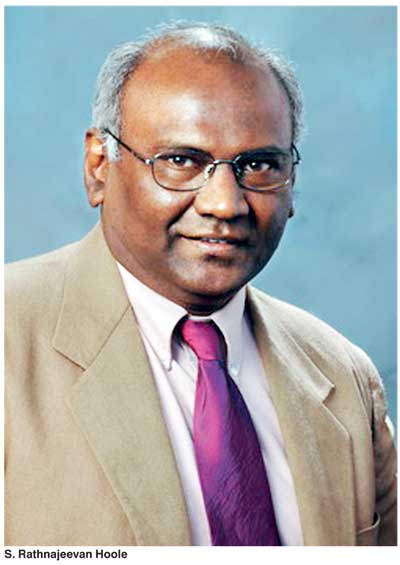Saturday Feb 21, 2026
Saturday Feb 21, 2026
Tuesday, 6 June 2017 00:10 - - {{hitsCtrl.values.hits}}
by P.D. De Silva
Hate speech insults and threatens the targeted group and makes them live in fear or shames them, making them hide who they are, said Professor S. Rathnajeevan Hoole, former Vice Chancellor of the University of Jaffna and Member of the Election Commission of Sri Lanka.
He was delivering the opening address at the workshop on election reporting conducted by the International foundation for Electoral Systems (IFES) held recently.
“Sri Lanka is full of hate speech whether over elections or not. We are particularly ignorant of defamation laws and browsing through web-based discussion pages will show you to what degree hate speech is being used. On the other hand India is quite strict about hate speech, perhaps too strict and we must learn from their experience,” he added.
Noting that our culture is rather insensitive on hate speech, he said: “As examples I wish to cite the following real life stories: When I was young, my bicycle repairman, long dead now, was mute or speech-impaired as we would now say. Although he had a name, he was referred to as ‘Mute’ (Oomai in Tamil). I never got to know his name. Going to him, we would ask ‘Is Mute in?’ Boys looking for fun would deliberately anger him. He, unable to speak, would scold them in undecipherable sounds, which is what the boys wanted. And they enjoyed it!”
Another story he related was about the school of a head teacher with childhood polio who had his school nicknamed ‘Crooked  School’ or ‘Choththip Pallikoodam’. “He is long dead but the school even today is occasionally referred to by that egregious nickname! Although we pride ourselves as modern, in reality we are quite primitive and cruel. These terms like ‘Oomai’ and ‘Choththi’ were part of our normal discourse. While they did not widely enter our newspapers, their firm roots in our society show why hate speech in the press is difficult to stamp out.”
School’ or ‘Choththip Pallikoodam’. “He is long dead but the school even today is occasionally referred to by that egregious nickname! Although we pride ourselves as modern, in reality we are quite primitive and cruel. These terms like ‘Oomai’ and ‘Choththi’ were part of our normal discourse. While they did not widely enter our newspapers, their firm roots in our society show why hate speech in the press is difficult to stamp out.”
Another incident he recollected was that when the candidature of the wife of a member of LTTE was discussed by a recognised political patty, there was concern that she would bring her politics into the party. “The instantaneous response was ‘Do not worry. If we shout at her twice, she will keep quiet.’ But although I do not agree with her on many things she is a successful politician today. The point is that women, given the chance, grow into their shoes.”
Professor Hoole stated that as the Vice Chancellor of the University of Jaffna, he had been a victim of hate speech.
“In hate speech debates, the competing norms have to do with the rights and safety of minorities on the one hand, and the freedom of speech and thought on the other. Hate speech targets people or a group of people based on their race, religion, ethnic origin, sexual orientation, disability or gender. What is commonly heard of women politicians makes it quite obvious why we have only some 5% women in Parliament!
“Hate speech always puts down minorities as the majority have the protection of their larger numbers. Minorities will rarely have the guts to say hateful things about the majority, because if and when they do, they risk getting wiped out! As minorities are most often the target of hate speech, hate speech laws (if any) would ostensibly be to protect minorities, yet, I am firmly against laws restricting hate crime. A good example would be the law enforcement in Sri Lanka. It is not race neutral. In as simple a matter as speeding tickets, going by my experience plying the A9, minorities are ticketed the most (at least by proportion). What I have noticed is that when stopped by the police my Tamil drivers would immediately get down from the car and plead. They always carry a small wad of hundred rupee notes, part with a few and get away but my Sinhalese drivers remain seated and smile and talk in Sinhalese, they mention the Election Commission and are let off.”
Asserting that hate crime laws would never protect minorities and would at the same time curtail free speech by minorities, he asserted: “Every time I raise difficulties that minorities face, the response is that I am promoting communalism and communal division. Thus with hate speech laws in place, even the little we get to say will be suppressed.”
“In Sri Lanka, giving a person’s name is as good as giving his ethnicity and even caste. In the selection of candidates by political parties caste is always a consideration. Can we report it? I have personally been troubled by this issue. I saw exposing the oppression as the greater good, compared to the disservice done in identifying a person as a member of an oppressed caste. I do not have all the right answers. But you certainly have a lot to think about,” Professor Hoole said in conclusion.